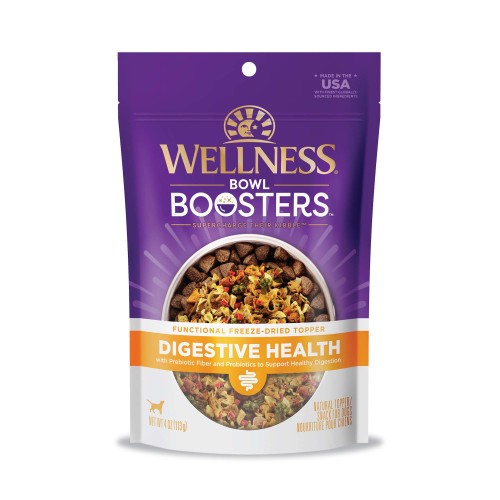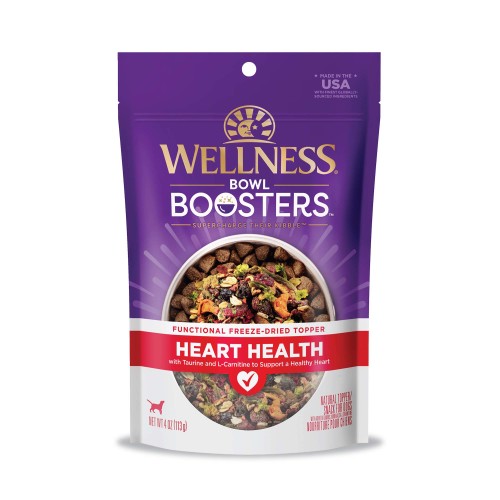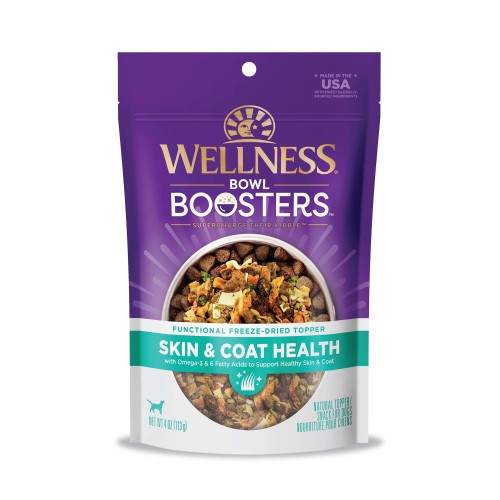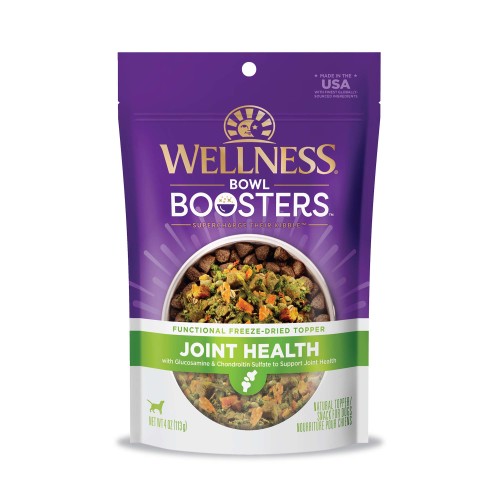August 5, 2022
What Are Some Healthy Snacks For My Dog?
Most dogs love eating human snacks and table scraps. If your dog is food-motivated, you may have found yourself wondering about healthy snacks you can give them on a regular basis.
Let’s talk about how we’re defining “healthy” dog snacks, what human snacks your dog should or shouldn’t eat, and other ways to keep your beloved pet healthy, happy, and thriving.
What Makes A Snack Healthy For Dogs?
Healthy dog snacks can have many different qualities. For example, you should aim to give your dog snacks with wholesome, nutritious, easily digestible ingredients. Some healthy snacks may even support digestive, skin and coat, and joint health!
However, foods that are safe for your dog may not necessarily be healthy. For example, while dogs can technically eat cheese, this fatty and salty treat is not a healthy snack for dogs on a diet. Even one ounce of cheese can add about 100 calories to your dog’s daily diet, meaning a 20-pound dog should only eat 1/3 ounce of cheese as their only treat for the day.
Similarly, plain nut butters are usually dog-safe, but tend to be high in calories and oil. If you’re giving your dog a nut butter snack, it’s especially important to choose as natural a brand as possible. Make sure it does not contain any xylitol, which can be highly toxic to dogs.
If your pet needs to shed a few pounds, you should also avoid other high-calorie snacks like baked goods, sausages, jerky, or starchy foods such as sweet potato.
Healthy Human Snacks For Dogs
There are plenty of foods your dog can eat that you can probably find right in your own kitchen. Remember that you should still offer healthy snacks in moderation, whether or not your dog is on a diet.
Generally, “moderation” means the snacks you give your dog should not be more than 10% of their total calorie intake. It can also mean limiting the amount of a specific snack that your dog eats, such as sugary fruits, to maintain the right nutritional balance.
You can ask your vet about your dog’s specific daily calorie requirements, or check online for a calorie calculator.
What Fruits Can Dogs Eat?
Fruit can be an excellent source of fiber, vitamins, and minerals for your pet. They also tend to be low in calories and fat. However, some fruits have high sugar content, so portion control is key.
Here are some fruits that your dog can eat:
- Apples and pears without the seeds and core
- Bananas, pineapples, strawberries, and mangos: Offer these sugary fruits in moderation
- Watermelon and cantaloupe without the rind and seeds (Bonus: they can help keep your dog hydrated!)
- Oranges without the peel and seeds
- Peaches without the pits
- Fully cooked, plain squashes, including pumpkin and zucchini
- Raspberries, blackberries, and blueberries: Less than a cup at a time
Make sure you avoid giving your dog the following fruits:
- Avocados: Contain a toxin called persin
- Cherries: The fleshy part around the seed is technically safe for dogs, but cherry stems and seeds contain cyanide
- Grapes: Both grapes and raisins are known to cause kidney failure in dogs
- Tomatoes: Contain a toxin called solanine
What Vegetables Can Dogs Eat?
Similar to fruits, vegetables can be healthy dog snacks thanks to their fiber, vitamin, mineral, and water content. Make sure you feed your dog vegetables raw, boiled, or steamed, without adding seasoning, butter, or oil.
Here are some vegetables you can feed your dog:
- Cucumbers (Bonus: These are a great healthy snack for dogs on a diet!)
- Brussels sprouts, broccoli, and cabbage: Avoid these if your dog is prone to gastric irritation
- Carrots (Bonus: These are both low-calorie and high-fiber!)
- Celery (Bonus: Celery can also keep your dog’s breath fresh!)
- Green beans and peas: If you’re buying canned, look for plain, low- or no-salt products
- Zucchini
Make sure you avoid giving your dog the following vegetables:
- Asparagus
- Mushrooms
- Onions, garlic, leeks, and chives
- Spinach: While dogs can technically eat spinach, large amounts can potentially lead to kidney damage
Other Healthy Snacks For Dogs You Can Find In Your Kitchen
Besides fruits and vegetables, there are other common human foods that can be healthy for your dog. Here are a few examples:
- Plain protein, such as cooked, unseasoned chicken, turkey, beef, or salmon: Make sure all bones are removed, and aim for low fat content when possible
- Cooked grains, including rice, pasta, or oatmeal: Read the ingredients label carefully and look for simple, plain products
- Dairy: Plain yogurt can be great for your dog’s digestive health, and as long as your dog isn’t lactose intolerant or on a diet, it’s okay to offer cheese in moderation
- Nut butters: As we mentioned before, these may not be healthy snacks for dogs on a diet, but xylitol-free nut butters are safe for dogs to eat in moderation
- Eggs: Some owners feed their dogs raw eggs, but we do not recommend this; feeding raw eggs to dogs could expose them to salmonella, and can also lead to biotin deficiency, which can negatively affect the health of their skin, metabolism, cells and digestion. However, plain boiled eggs can be a safe and healthy snack for dogs.
Ingredients To Avoid When Looking For Healthy Dog Snacks
Pretty much everyone knows that dogs should never eat chocolate. Here are some other foods and ingredients you should avoid giving your dog:
- Synthetic antioxidants, like BHA or BHT
- Preservatives like ethoxyquin
- Artificial coloring
- Xylitol and other sugar alcohols, which are often found in gum, candy, and some brands of peanut butter
- Corn syrup or excessive sweeteners
- Macadamia nuts
- Caffeine, including caffeine-like molecules such as theobromine, which is commonly found in chocolate
- Ethanol, which is found in alcohol and yeast dough
These foods and ingredients can cause digestive issues or even be toxic to your pet. You should also avoid small snacks that can cause blocks in your dog’s throat or intestines.
Healthy Snack Alternatives For Dogs
While there are plenty of healthy human snacks that you can give your dog, cleaning and preparing fruits and vegetables or carefully checking food labels can take some time and effort.
If you’re looking for healthy snack alternatives, dog treats, mixers, and toppers are all healthy for your dog as well. Take a look at a few options from Good Dog by Wellness that are carefully formulated with your dog’s health in mind:
- Chicken & Carrots Happy Puppy Treats: All-natural, packed with protein, and perfect for growing, energetic pups
- Chicken & Venison Training Rewards Treats: Tender and tearable soft treats that support your dog’s skin and coat
- Beef & Chicken Tender Toppers: Delicious, nutritious toppers to make your dog’s meals even healthier
Some dogs prefer a crunchier texture, so dog biscuits may be a better option for your pet. Check out The Great Dog Biscuit Guide to learn more.
Every pet is different, so as a pet parent, you should keep your dog’s allergies, food sensitivities, and texture or flavor preferences in mind. If you have any other questions about healthy snacks for your dog, we’re always here to help.





